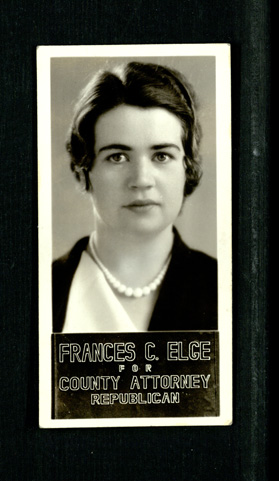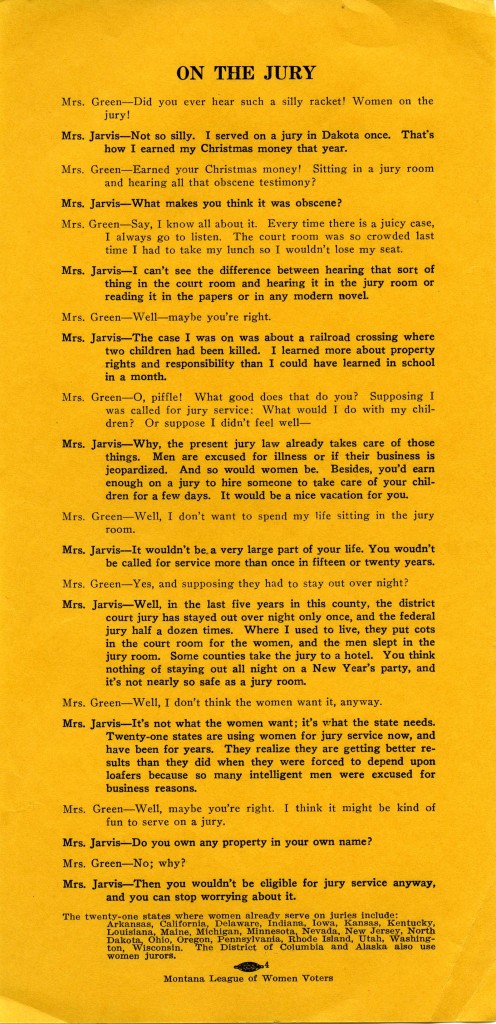
Born in Helena in 1906, Elge attended that city’s public schools and went on to graduate from law school at the University of Montana in 1930. Reflecting on her time at UM and her subsequent career as an attorney, Elge recalled, “I was a novelty when I went through law school. The men helped me along because they didn’t see me as competition. Men today know better.”
After law school she returned to Helena, where Wellington Rankin—a prominent Helena attorney and public official and brother of Congresswoman Jeannette Rankin—allowed her to use his library and office and gave her ten cases to start a private practice. She continued in private practice until 1932, when she was elected to the position of public administrator in Lewis and Clark County. Two years later the voters elected her county attorney, the second woman elected in Montana to that office.
After a single term, Elge left to work on Jeannette Rankin’s second campaign for Congress and acted as the congresswoman’s administrative assistant in Washington, D.C. During World War II she worked for the War Shipping Administration and Maritime Commission. In 1954 she became an Indian probate judge for the Department of Interior, one of the only women in that position, and served until her retirement in 1977.
Elge’s political activism was as noteworthy as her legal career. One of her early victories was to successfully lobby for jury service for women. Even though Montana women had attained the vote in 1914, they did not have the right to sit on juries. Supporters of women’s jury service framed the argument in terms of equality. In a 1923 issue of the Helena Independent, one advocate wrote, “This obstacle should be removed for [women have] now . . . attained equal rights in all activities, the law, medicine, business, and the various professions . . . we even have lady bootleggers.”

Elge became interested in the issue after serving as county attorney and encountering all-male juries. Along with friend and fellow activist Belle Fligelman Winestine, Elge took up the cause through the League of Women Voters and Business and Professional Women’s Clubs. Winestine and Elge also created a coalition of support among organized labor and the Montana Farmers Union. Persuaded by their lobbying efforts, Montana passed the Women’s Jury Service Act in 1939.
Elge continued to champion women’s rights in Montana well past her retirement. She was “an omnipresent force” during the debate over Montana’s ratification of the Equal Rights Amendment in the early 1970s and again when anti-ERA forces mobilized to rescind ratification. A charter member of the Montana Council for the Equal Rights Amendment, she actively lobbied against nullification at the 1975, 1977, and 1979 legislative sessions.
Elge adopted a deliberately feminine style of politics that might have seemed old-fashioned in the second half of the twentieth century, but it was an approach that nonetheless served her well in her career and activism. Rather than acting and behaving “like a man” to succeed in the worlds of the law and politics, Elge remained, in her own words, “positive and aggressive without being abrasive.” “I always played the game,” she told a reporter in 1974. “I dressed in a feminine manner and I put up with the prejudice. Quietly but surely, I made my way up through the ranks.”
Elge passed away in 1991 at the age of eighty-four. After her death, the Montana Supreme Court issued a resolution in her honor, crediting her with “a legacy of spirited advocacy on behalf of women, and ultimately on behalf of all humankind.” AH
Read more about the problems of all-male juries in “Biased Justice: Women in Prison.”
Learn about other pre-World War II Montana women politicians in “After Suffrage.”
Learn about a Second Wave feminist with a very different personal style in “Feminism Personified: Judy Smith and the Women’s Movement.”
Sources
“Attorney Remembered for Wit and Devotion to Causes.” Billings Gazette, September 29, 1991, 1B, 4B. Copy in Frances Elge Vertical File, Montana Historical Society Research Center, Helena.
“Banquet to Honor Former Official.” Helena Independent Record, January 26, 1992, 6A. Copy in Frances Elge Vertical File, Montana Historical Society Research Center, Helena.
Barz, Diane G. “Francis [sic] C. Elge: ‘A Chic and Wise Magistrate’.” Montana Lawyer, December 1991, 10. Copy in Frances Elge Vertical File, Montana Historical Society Research Center.
Carlson, Judith, comp. Untitled memorial, t.s., courtesy Janet Sperry. Copy in Frances Elge Vertical File, Montana Historical Society Research Center.
Clawson, Roger. “For Fifty Years She’s Fought for Women.” Billings Gazette, November 3, 1980. Copy in Elge Past, box 1, Frances C. Elge Papers, 1921-1991, Montana Historical Society Research Center.
“Elder Lawyer Lore.” Montana Lawyer, January 1983, 3. Copy in Frances Elge Vertical File, Montana Historical Society Research Center.
“Elge, Frances C. (Miss).” Copy in Correspondence 1940s fldr, box 1, Frances C. Elge Papers, 1921-1991, Montana Historical Society Research Center.
“Frances C. ELge, 1906-1991,” 53 Mont. L. Rev. 1 (1992). Copy at http://heinonline.org/HOL/LandingPage?collection=journals&handle=hein.journals/montlr53&div=6&id=&page. Accessed January 12, 2014.
“‘His Honor’ Is a Woman.” Billings Gazette, July 23, 1974, 17. Copy in Elge Past fldr, box 1, Frances C. Elge Papers, 1921-1991, Montana Historical Society Research Center.
“House Kills Montana ERA Nullification.” Helena Independent Record, March 11, 1979, 12. Copy in ERA fldr, box 1, Frances C. Elge Papers, 1921-1991, Montana Historical Society Research Center.
McCammon, Holly J. “Explaining Frame Variation: More Moderate and Radical Demands for Women’s Citizenship in the U.S. Women’s Jury Movements.” Social Problems 59, no. 1 (February 2012), 43-69.
“Miss Elge Woman of the Year.” Billings Gazette, June 6, 1971. Copy in Elge Past fldr, box 1, Frances C. Elge Papers, 1921-1991, Montana Historical Society Research Center.
Rasky, Constance. “Interview: Fran Elge– Ms. Montana,” t.s. Copy in Elge Past fldr, box 1, Frances C. Elge Papers, 1921-1991, Montana Historical Society Research Center.
0 thoughts on ““Men Were My Friends, but Women Were My Cause”: The Career and Feminism of Frances Elge”